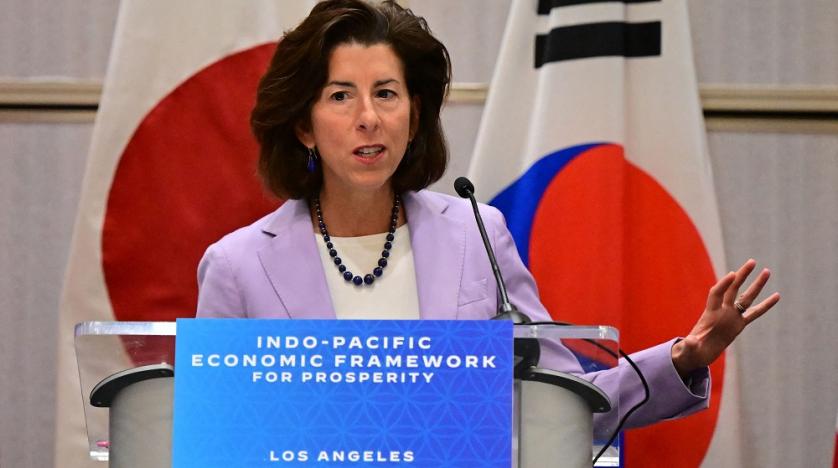US, Asian Alliance Agree on 4 Economic Sectors to Counter China

Asharq Al-Awsat
The United States and a group of Asian allies on Friday agreed on a set of negotiating targets, as Washington looks to offer an alternative to the economic might of China in the region.
At the first ministerial for the Indo-Pacific Economic Prosperity Framework (IPEF), officials sketched the basis for common standards on key pillars, which also included digital sector, green energy, labor law, and the fight against corruption, in 14 countries.
“I feel very confident saying that IPEF will create jobs in the United States and will create jobs in other IPEF countries,” US Commerce Secretary Gina Raimondo said at the conclusion of the meeting.
“We were able to finalize all four of the ministerial statements, which lay out the full scope of the framework and provide a roadmap for future discussions.”
The initial meeting offered little flesh on the bones of the plans, which come several years after former President Donald Trump yanked the United States out of a much more comprehensive and hard-won regional trade block.
The Trans-Pacific Partnership (TPP), which has since gone ahead without Washington, was hailed as a “high quality” pact that offered a genuine bulwark to Chinese economic power.
But with US public opinion more wary of free trade agreements, which are seen as a threat to American jobs, President Joe Biden’s administration opted not to rejoin that pact.
“If the US remains absent from the region, that’s a risk,” a participant said, noting how Beijing has frequently dangled sweeteners to regional players, in the form of infrastructure aid.
“Their help also comes with strings attached and in the long run, that can really hurt US companies in the region.”
The IPEF brings together the United States, Australia, Brunei, Fiji, India, Indonesia, Japan, South Korea, Malaysia, New Zealand, the Philippines, Singapore, Thailand and Vietnam.
The alliance is in theory an “open platform” that could eventually include other countries, but does not include Taiwan, a self-ruled island that Beijing claims as its own.
Latest News
-
 Cabinet suspends mandatory retirement rules, approves funding measures
Cabinet suspends mandatory retirement rules, approves funding measures
-
 Lebanon state media says 3 killed in Israeli strike on vehicle near Sidon
Lebanon state media says 3 killed in Israeli strike on vehicle near Sidon
-
 Syria State Media Says Kurdish Force Shelling Kills One Person in Aleppo City
Syria State Media Says Kurdish Force Shelling Kills One Person in Aleppo City
-
 Crown Prince chairs meeting to review programme on combating littering
Crown Prince chairs meeting to review programme on combating littering
-
 King congratulates Morocco monarch on football team’s 2025 Arab Cup win
King congratulates Morocco monarch on football team’s 2025 Arab Cup win